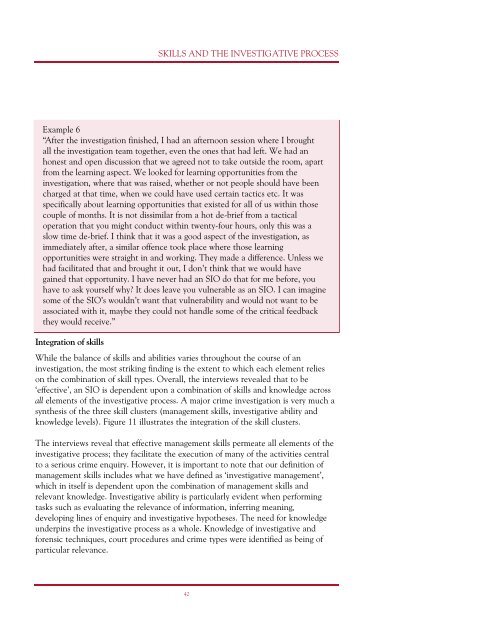Effective Detective
Effective Detective
Effective Detective
- No tags were found...
You also want an ePaper? Increase the reach of your titles
YUMPU automatically turns print PDFs into web optimized ePapers that Google loves.
SKILLS AND THE INVESTIGATIVE PROCESSExample 6“After the investigation finished, I had an afternoon session where I broughtall the investigation team together, even the ones that had left. We had anhonest and open discussion that we agreed not to take outside the room, apartfrom the learning aspect. We looked for learning opportunities from theinvestigation, where that was raised, whether or not people should have beencharged at that time, when we could have used certain tactics etc. It wasspecifically about learning opportunities that existed for all of us within thosecouple of months. It is not dissimilar from a hot de-brief from a tacticaloperation that you might conduct within twenty-four hours, only this was aslow time de-brief. I think that it was a good aspect of the investigation, asimmediately after, a similar offence took place where those learningopportunities were straight in and working. They made a difference. Unless wehad facilitated that and brought it out, I don’t think that we would havegained that opportunity. I have never had an SIO do that for me before, youhave to ask yourself why? It does leave you vulnerable as an SIO. I can imaginesome of the SIO’s wouldn’t want that vulnerability and would not want to beassociated with it, maybe they could not handle some of the critical feedbackthey would receive.”Integration of skillsWhile the balance of skills and abilities varies throughout the course of aninvestigation, the most striking finding is the extent to which each element relieson the combination of skill types. Overall, the interviews revealed that to be‘effective’, an SIO is dependent upon a combination of skills and knowledge acrossall elements of the investigative process. A major crime investigation is very much asynthesis of the three skill clusters (management skills, investigative ability andknowledge levels). Figure 11 illustrates the integration of the skill clusters.The interviews reveal that effective management skills permeate all elements of theinvestigative process; they facilitate the execution of many of the activities centralto a serious crime enquiry. However, it is important to note that our definition ofmanagement skills includes what we have defined as ‘investigative management’,which in itself is dependent upon the combination of management skills andrelevant knowledge. Investigative ability is particularly evident when performingtasks such as evaluating the relevance of information, inferring meaning,developing lines of enquiry and investigative hypotheses. The need for knowledgeunderpins the investigative process as a whole. Knowledge of investigative andforensic techniques, court procedures and crime types were identified as being ofparticular relevance.42


